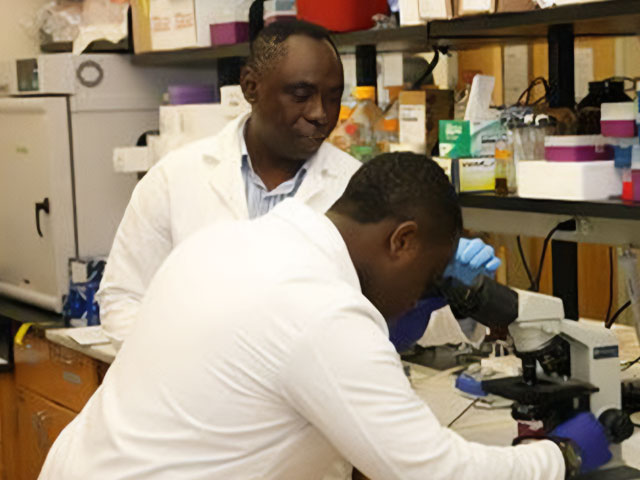Expanding Infrastructure for Translational and Health Disparities Research in the FAMU CoPPS, IPH
National Institutes of Health provide continual support
Tallahassee, FL - The successful National Institutes of Health (NIH) | Turning Discovery Into Health (NIH) Infrastructure Grant titled "Expanding Infrastructure for Translational and Health Disparities Research at Florida A&M University" will bring $7,991,046 in funding for retrofitting the fourth shell floor of the New Pharmacy Building Phase II (East Wing), according to FAMU CoPPS, IPH Principal Investigator, Selina Faith Darling-Reed, PhD, Associate Dean, Professor of Pharmacology | Pharmaceutical Sciences (famu.edu) who enthusiastically shared the great news. The project summary/abstract for the overarching goal of this grant award is: “to build out a multi-disciplinary 16,000 square foot integrated shared service core facility.

She further noted: “This was a laborious, team effort with astute and erudite participants: Drs. Karam F.A. Soliman, Seth Y. Ablordeppey, Kinfe Ken Redda, Mandip Sachdeva, Sandra G. Suther, R. Renee Reams, John Luque, Elizabeth Mazzio, and Mr. Craig Talton, FAMU Executive Director Office of Facilities, Planning, Construction, & Safety (famu.edu). Now, the entire Pharmaceutical Sciences Division can begin to help facilitate the growing demands for physical space, required for collaborations between biomedical and behavioral research focusing on solutions for minority health and health disparities.”
As a Historically Black College and University (HBCU) first established in Tallahassee, Florida on October 3, 1887, today (almost 137 years later), is geographically ideal for serving the surrounding counties with large African American populations. FAMU is also an institution of emerging excellence (42 USC 283k(c)(2)) and a Carnegie R2-High Research Activity University. FAMU’s CoPPS, IPH is one of the many FAMU research-intensive facilities with minority learner bodies abiding in a unified, central, principal mission to serve and educate the African American community through instruction, research, and community outreach, in order to help reduce health disparities.
Dr. Darling-Reed emphasized: “This NIH award facilitates FAMU’s Expanding Infrastructure for Translational
and Health Disparities Research (FAMU-EIR) and will help overcome major deficiencies in physical infrastructure stemming from
logistical inefficiencies such as workflow dispersed across three separate buildings;
to the University as a whole, an outreach center for community engagement is sorely
needed.” A centralized FAMU-EIR facility is in alignment with FAMUs 2030 defined goals: to obtain classification as a Carnegie R1-Very High Research Activity Institution; as well as those of its research funding agencies such as U54 Research Centers in Minority Institutions Program (nih.gov), the National Cancer Institute (NCI) | National Institutes of Health (NIH), and the Care2 Center – Florida-California Health Equity Center (care2healthequitycenter.org). The anticipated space for the facility is present and allocated for this very purpose,
on Level Four, as one of two open, empty shell floors, in the Phase II, East Wing
| New Pharmacy Building (NPB), a five-story addition to the NPB Phase I funded by
the Florida Legislature in 2014-2015. The building is architecturally sound, and Level
Four will be built out using LEED (Leadership in Energy and Environmental Design)
concepts developed by the U.S. Green Building Council (USGBC) abiding in efficiency,
life-cycle cost analysis (LCCA) for optimized sustainability, quality, and function.
The much-needed FAMU-EIR facility will serve as a central multidisciplinary service
hub, strategically designed to encourage intercommunication between researchers in
a tandem roadmap with the behavioral/public health/community engagement center, fostering
an ongoing transdisciplinary workflow and innovative translational technologies, leaving
a lasting legacy of societal impact. Again, KUDOS to the FAMU CoPPS, IPH—better together!




